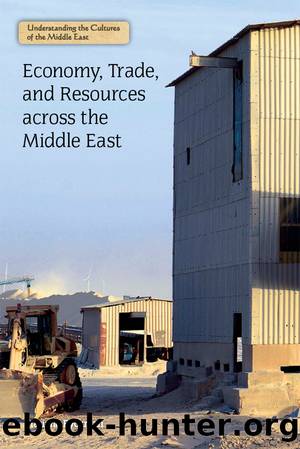Economy, Trade, and Resources Across the Middle East by Ryckman Tatiana;

Author:Ryckman, Tatiana; [Ryckman, Tatiana]
Language: eng
Format: epub
Publisher: Cavendish Square Publishing LLC
Neighboring Syria took control while the Iran-supported group, Hezbollah, found traction in Lebanon and even gained representation in its parliament. Hezbollah is a Shia militant group and political movement, and it has been classified as a terrorist organization by some countries, including the United States.
Lebanon was finally able to oust Syrian forces in 2005 with help from the United Nations. The UN placed a combined Sunni and Christian government in charge of reconstruction but, in 2006, Hezbollah and Israel rekindled previous aggression following the abduction of Israeli soldiers. Infrastructure was destroyed in the conflict, and Iran continues to fund Hezbollah in Lebanon today. Many Lebanese feel that so much outside influence blocks any chance of progress. Lebanon is home to many religious and ethnic factions, making religious and cultural disputes difficult to navigate, especially to an outsider.
Resources, Commerce, and Trade
Lebanon benefits from many natural resources, which include fossil fuels, agricultural land, and a long Mediterranean coastline that provides both ports for trade and resorts for tourism. Yet the economy still suffers as a result of perpetual conflictâsometimes from conflicts not even within Lebanonâs own borders.
The civil war in Lebanon lasted until 1990 and nearly devastated the economy. It is thanks, in large part, to the window of peace that followed the war and the countryâs stable banking industry that it was able to experience growth. Soon after the conflict, the Lebanese government was able to begin collecting taxes, rebuild the capital city of Beirut, and attract tourists to its resorts.
A month-long war in 2006 nearly undid the years of rebuilding that had led to the countryâs relative stability. By focusing on real estate and tourism, Lebanon was able to rebuild its tourism sector, which saw enormous growth between 2008 and 2012 and accounted for roughly 10 percent of the national income. However, conflict has again gotten in the way of progress, this time in neighboring Syria. Tensions in Syria have led to a drop in tourism to Lebanon, as well as a flood of Syrian refugees entering the country, causing job shortages and a spike in poverty levels.
The Lebanese economic system is laissez-faire, meaning the government is uninvolved in private transactions and does not collect tariffs, enforce regulations, or offer subsidies. These policies further perpetuate high national debt, which was 130 percent of the countryâs GDP in 2015âdown from 150 percent in 2010.
Israel
Israel was created from the British mandate of Palestine to create a home for the millions of nationless Jewish people living in the area in 1948. The Israeli-Arab conflict, which began following the creation of Israel, has dominated the region since the formation of this new country.
Following increased tensions in 1967, Israel and multiple Arab nations fought in what is known as the Six-Day War. The Arab nations experienced devastating losses, allowing Israel to claim even more land, including the Gaza Strip and the Sinai Peninsula from Egypt, the Golan Heights region from Syria, and the West Bank from Jordan. The Sinai Peninsula was eventually returned to Egypt,
Download
This site does not store any files on its server. We only index and link to content provided by other sites. Please contact the content providers to delete copyright contents if any and email us, we'll remove relevant links or contents immediately.
Pale Blue Dot by Carl Sagan(4621)
Cracking the GRE Premium Edition with 6 Practice Tests, 2015 (Graduate School Test Preparation) by Princeton Review(4049)
Pocahontas by Joseph Bruchac(4030)
Unfiltered by Lily Collins(3912)
The Emotionary: A Dictionary of Words That Don't Exist for Feelings That Do by Eden Sher(3222)
The Daily Stoic by Holiday Ryan & Hanselman Stephen(3111)
Factfulness_Ten Reasons We're Wrong About the World_and Why Things Are Better Than You Think by Hans Rosling(3047)
The President Has Been Shot!": The Assassination of John F. Kennedy by Swanson James L(2973)
Sapiens and Homo Deus by Yuval Noah Harari(2845)
Rogue Trader by Leeson Nick(2829)
The 48 laws of power by Robert Greene & Joost Elffers(2812)
The Rape Of Nanking by Iris Chang(2652)
Almost Adulting by Arden Rose(2588)
Gettysburg by Iain C. Martin(2579)
The Innovators: How a Group of Hackers, Geniuses, and Geeks Created the Digital Revolution by Walter Isaacson(2505)
500 Must-Know AP Microeconomics/Macroeconomics Questions(2476)
The Plant Paradox by Dr. Steven R. Gundry M.D(2430)
In the Woods by Tana French(2418)
Make by Mike Westerfield(2203)
